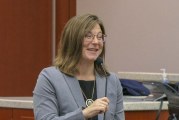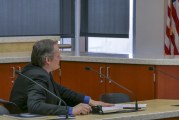Clark County Council will include a professed Democrat for the first time in four years
VANCOUVER — I hope you took the time to read the story written by ClarkCountyToday.com’s standout reporter Chris Brown about Temple Lentz joining the Clark County Council, Lentz, an engaged Clark County resident, defeated Councilor Jeanne Stewart in the race for the District 1 seat on the council.
It was appropriate for us to hear from Lentz as the newest member of the council, which will have another new councilor later this month when someone is appointed to fill the District 4 seat vacated by Eileen Quiring, who was elected to take over the position as county chair. Here’s a link to that story:
Temple Lentz joins Clark County Council

It was also appropriate for Brown to ask Lentz about being the only professed Democrat on the council. Lentz is the first Democrat to occupy a seat on the council since Ed Barnes served about five months after he was appointed to replace Steve Stuart on the then three-member Board of County Commissioners. in June of 2014. Stuart, also a Democrat, told me at the time he was not having his voice heard by fellow commissioners David Madore and Tom Mielke, both stated Republicans.
Stuart also told me at the time, and I’m quoting him from memory after four and a half years, “what’s ideological about a pothole?’’ His point being that local politics shouldn’t be about ideology. In her response to Brown in today’s story, Lentz offered the same sentiment as Stuart did when he resigned his position as a commissioner.
“What I want to see is people who are invested in good governance, and in doing the right thing for Clark County,” Lentz told Brown. “And that is often a nonpartisan issue.
“There will be times when we differ,” she continued, “but I’m looking forward to it. And in some things, like in funding the roads, dealing with the jail, these can be nonpartisan issues. So I think there are going to be a lot of places where we find agreement, and I’m looking forward to finding those so we can get work done.”
I essentially agree with Lentz and Stuart. Local politics shouldn’t be as ideological as national politics. At the local level, the decisions are often about nonpartisan issues such as repairing roads and other fundamentally local, somewhat non-ideological, items similar to fixing potholes. Members of the Clark County Council, for example, are not going to be asked to reverse Roe v. Wade.
I guess you can make the argument that the issue of legalizing marijuana is an ideological conversation. And, going forward, the new council in 2019 will likely address the issue of lifting the county’s ban on marijuana sales, so I concede the ideological makeup of the council could be an issue in that discussion.
Before, I move on, I must also point out that even though the council has been predominantly Republican in the past four years, the members’ decisions have often been far from conservative. Outgoing Chair Marc Boldt used to profess to be a Republican but in recent years labeled himself as an Independent. Councilors Julie Olson and John Blom, identify themselves as Republicans, but I think most people view them as independent or moderate. The same case could be made for the departing Stewart. The three candidates who the council will select from to appoint as Quiring’s replacement will each be nominated by the Clark County Republican Party. But, with three of the four existing councilors more moderate than conservative, there’s no guarantee the appointee will lean more to the conservative side. The sitting councilors will likely choose the most moderate candidate nominated.
As you know by now if you’ve read my editorial thoughts throughout my career, my opinions usually align with a conservative ideology. I like to think that I reflect on every issue individually and don’t just fall in line like a sheep with a herd. But, certainly more times than not, I tend to lean to the right rather than the left. So, I profess that to you as transparently as I can.
The one area where I absolutely believe ideology is an issue in local politics is when it comes to economics, specifically spending and the taxation necessary to fund that spending. Fiscal conservatism is defined as “a political-economic philosophy regarding fiscal policy and fiscal responsibility advocating low taxes, reduced government spending and minimal government debt.’’ I, and I believe many others, would like to see our county council practice fiscal conservatism moving forward.
In 2015, Madore was unsuccessful in his attempt to pass a proposed 2 percent cut in property taxes. Here is a story I wrote as editor of The Reflector Newspaper about Madore’s effort to allow county residents to keep a little more of their money:
http://www.thereflector.com/news/article_6f526212-6163-11e5-817b-1bf35d7b0550.html
In the spirit of transparency, Madore is owner and founder of ClarkCountyToday.com. I don’t mention his 2015 proposed tax cut to curry favor with the man who signs my check. But, at the time and even now, it sure made a lot of sense to me. If you read my article at that time, the county was thriving. Property tax revenue was up 1.4 percent. Sales tax revenue was up 10 percent, for a combined 4 percent increase in tax revenue from the two sources. Unemployment rates were low and the county was exceeding state mandatory reserve levels. I offer this because it was evidence that there was a true fiscal conservative on the commission at that time.
There are always many factors that lead to the current economy at any given time, both locally and nationally. So, I’m not trying to profess causation that conservative values were the reason the county was doing so well financially in 2015. But, by the same token, I’m not conceding a lack of causation.
The important issue for many of us in the county is whether or not our current councilors have the fundamental ideology to take the absolute minimum amount of the taxpayers’ money as possible. Already, for the calendar year 2018, the council elected to raise property taxes by 1 percent (the most allowable by law). It was only the second time in the past seven years that the council elected to do so. Many of us don’t want to see the act of raising taxes to become a common occurrence in the future.
Also, on Dec. 31, the county council had an emergency meeting to approve an additional $4.22 million in spending due to cost overruns in several funds.
Council ends 2018 with emergency budget meeting

So, if keeping as much of your money as possible is important to you, it will be well worth your time to see how the new composition of the council impacts issues fiscal in nature.





